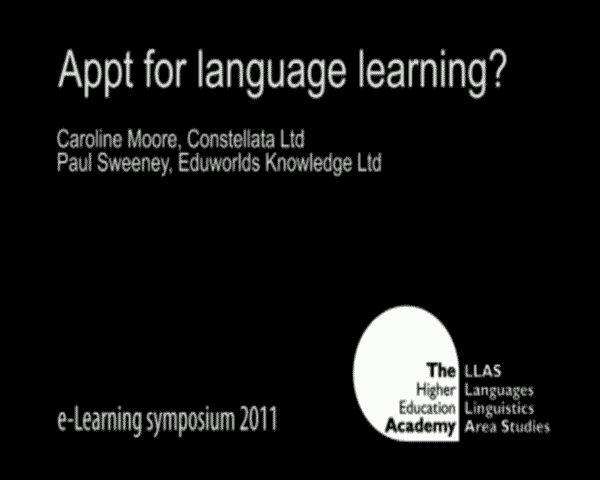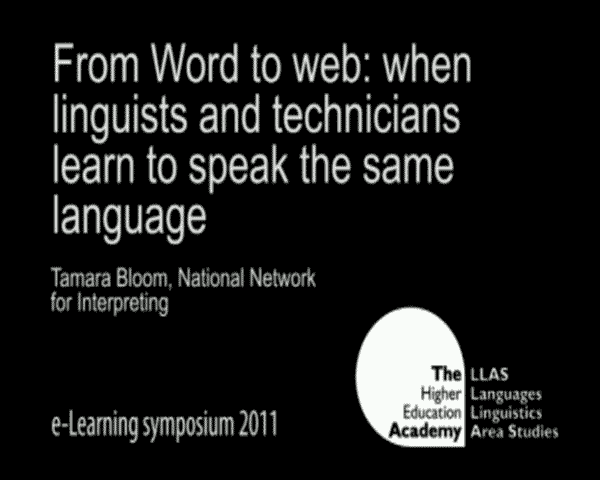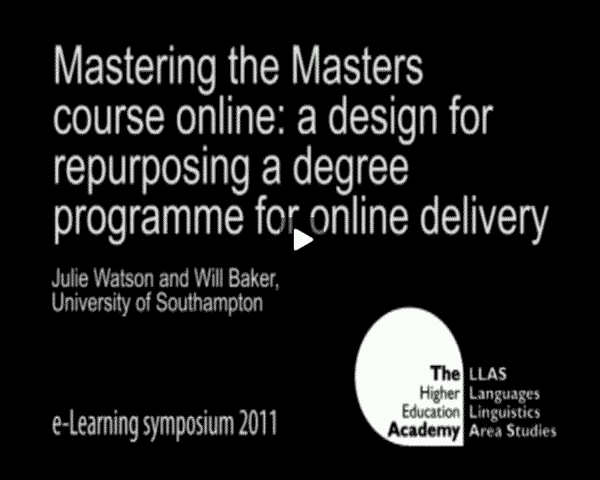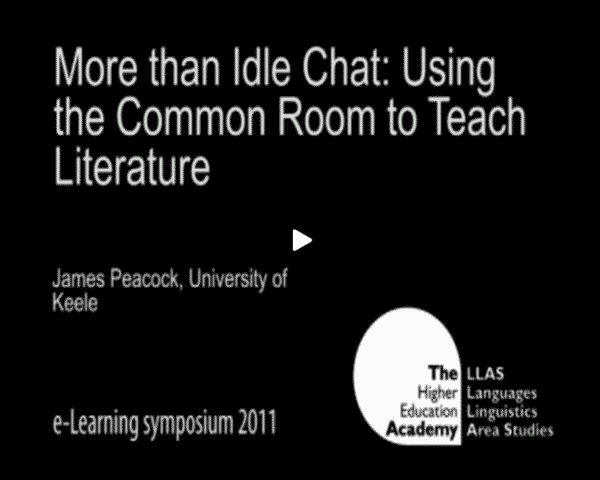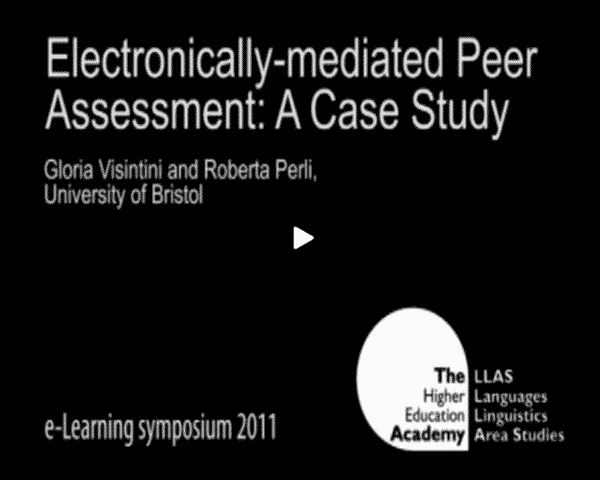e-Learning symposium 2011 - videos of sessions now available
Date: 27 January, 2011 - 28 January, 2011
Location: Avenue Campus (Bldg 65), University of Southampton
Event type: Symposium
Location map | Programme | Event report
Videos of sessions
All sessions were recorded and are available to view. Sessions from the main track in Lecture Theatre A are also available in a full interactive version.
You may need to install Microsoft Silverlight to view the full interactive videos.

This popular symposium combines practical activities and guidance with inspiring ideas to fuel the imagination.
The Subject Centre's 6th Annual e-Learning symposium will run over two days and will feature the following keynote speakers:
- Agnes Kukulska-Hulme, Professor of Learning Technology & Communication, The Open University
- Jon Beasley-Murray, University of British Columbia
- Marina Orsini-Jones, Principal Lecturer in the Faculty of Business Environment and Society, Coventry University
The day will also feature an exhibition and technical showcase area.
Pre-symposium workshop: 27 January 2011
The symposium on 28th January, will be preceded by a day of workshops which will include the following four options. Each of the workshops will run twice during the day and participants will be asked to select their two preferred options in advance of the day.
09.20 - 09.50 Registration
10.00 - 12.30 Parallel workshops
12.30 - 13.30 Lunch
13.30 - 16.00 Parallel workshops
1. Using Facebook for cultural immersion in the target language.
facilitated by Julien Hamilton-Hart, University of Swansea
This workshop is for teachers who have an interest in understanding how Facebook can be used in the language classroom for teaching in interesting and valuable ways. The session will be informal and will feature discussion of the issues around the use of Facebook/social networking sites in the classroom. There will be a practical activity which will give attendees the chance to make use of Facebook, Blackboard, Word, and JayCut video editing software, to create language learning activities enabling cultural immersion in the target language. No previous experience of Facebook or JayCut is necessary in order to attend this session.
2. e-Flashcards for Language Learning and Teaching: Past, Present and Future
facilitated by Mourad Diouri, University of Edinburgh
The use of flashcards in language is no new phenomenon and its effective use as a self-study tool has been utilised particularly in foreign language learning. Their potential for vocabulary building is still widely recognised in improving both reading speed and comprehension. However, since the emergence of e-Learning/web technologies, the use of traditional flashcards has been modernised and evolved with some useful interactive digital components, apparently the integration of images, audio pronunciation and e-assessment tools.
This session will explore the potential usage, educational advantages and pedagogical implications of digital flashcards in comparison to (or blended with) traditional paper cards. It will include a practical activity which will allow attendees to experiment with a variety of e-Flashcard authoring tools, and discuss and reflect upon good practice in using such software with students.
3.The Diachronic Electronic Corpus of Tyneside English (DECTE): effective practice in using this E-Learning Tool
facilitated by Adam Mearns and Hermann Moisl, University of Newcastle
This workshop will showcase a newly developed corpus of vernacular Tyneside (DECTE), discussing its creation, demonstrating its interface and applications and taking a practical look at how it can be used in teaching. The session will involve presentation and discussion about how corpora can be used in education, focussing on the work of the DECTE team. It will also involve a practical activity designed to familiarise attendees with the DECTE interface and practice using its applications for educational purposes. Attendees will also have the opportunity to evaluate DECTE and recommend improvements to site functionality to the DECTE team.
4. A practical look at the www.busuu.com university platform: exploring the potential integration of a Web 2.0 SNS into the HE curriculum.
facilitated by Billy Brick, University of Coventry
Social Networking Sites have the potential to transform language learning by providing opportunities for synchronous and asynchronous interaction, and by offering speaking, writing, reading and listening activities at a time and place of learners’ own choosing.
Most commercial language learning SNSs offer some free content alongside a premium feature for which registration and a modest payment is required. The package often includes a peer review facility where students can provide feedback to learners of their own first language, and some sites incorporate an award system, in the form of points (www.livemocha.com) or “berries” (www.busuu.com). This serves to motivate participants by rewarding them for their progress and for their peer review activities.
This session will explore a new platform on the www.busuu.com site which is aimed specifically at HE institutions as an alternative approach to foreign language teaching. The platform utilizes the existing premium content on the site but enables tutors to set up groups of learners. They can then assign homework, define deadlines, create discussions, and monitor the progress of the learners. In this informal workshop, attendees will have the opportunity to become familiar with the busuu software, and to complete an activity which allows them to evaluate the usefulness of the site and of SNSs in general.
| Time | Parallel sessions | ||||||||||||||||||||||||||||||||||||||||||||||||||||||||||||||||||||||||||||||||||||||||||||||||||||
|---|---|---|---|---|---|---|---|---|---|---|---|---|---|---|---|---|---|---|---|---|---|---|---|---|---|---|---|---|---|---|---|---|---|---|---|---|---|---|---|---|---|---|---|---|---|---|---|---|---|---|---|---|---|---|---|---|---|---|---|---|---|---|---|---|---|---|---|---|---|---|---|---|---|---|---|---|---|---|---|---|---|---|---|---|---|---|---|---|---|---|---|---|---|---|---|---|---|---|---|---|---|
| 09.30 - 10.00 | Registration | ||||||||||||||||||||||||||||||||||||||||||||||||||||||||||||||||||||||||||||||||||||||||||||||||||||
| 10.00 - 10.45 |
Lecture Theatre AMultimedia Multi-literacies in the 21st Century: Constructions, connections and cybergene awareness |
||||||||||||||||||||||||||||||||||||||||||||||||||||||||||||||||||||||||||||||||||||||||||||||||||||
| 10.45 - 11.15 |
Lecture Theatre ASolitary Innovators in a Connected World |
||||||||||||||||||||||||||||||||||||||||||||||||||||||||||||||||||||||||||||||||||||||||||||||||||||
| 11.15 - 11.45 | Coffee | ||||||||||||||||||||||||||||||||||||||||||||||||||||||||||||||||||||||||||||||||||||||||||||||||||||
| 11.45 - 12.45 | |||||||||||||||||||||||||||||||||||||||||||||||||||||||||||||||||||||||||||||||||||||||||||||||||||||
| 12.45 - 14.15 | Lunch and technology showcase which will include:
|
||||||||||||||||||||||||||||||||||||||||||||||||||||||||||||||||||||||||||||||||||||||||||||||||||||
| 14.15 - 15.20 |
Parallel session 2 |
||||||||||||||||||||||||||||||||||||||||||||||||||||||||||||||||||||||||||||||||||||||||||||||||||||
Lecture Theatre A |
Room 1177 |
Lecture Theatre C |
|||||||||||||||||||||||||||||||||||||||||||||||||||||||||||||||||||||||||||||||||||||||||||||||||||
|
Developing effective academic literacy online within the discipline: an integrated, interactive approach |
More than Idle Chat: Using the Common Room to Teach Literature |
Electronically-mediated Peer Assessment: A Case Study |
|||||||||||||||||||||||||||||||||||||||||||||||||||||||||||||||||||||||||||||||||||||||||||||||||||
| Innovative tutoring with Web 2.0 tools - English for Academic Purposes online Mirjam Hauck and Sylvia Warnecke, The Open University |
Appt for language learning? |
||||||||||||||||||||||||||||||||||||||||||||||||||||||||||||||||||||||||||||||||||||||||||||||||||||
| 15.20 - 16.00 |
Lecture Theatre AKnowledge 3.0: E-Learning, Social Media, and the Neoliberal University |
||||||||||||||||||||||||||||||||||||||||||||||||||||||||||||||||||||||||||||||||||||||||||||||||||||
| 16.00 |
Lecture Theatre AClosing remarks |
||||||||||||||||||||||||||||||||||||||||||||||||||||||||||||||||||||||||||||||||||||||||||||||||||||
Abstracts
Multimedia Multi-literacies in the 21st Century: Constructions, connections and cybergene awareness
by Marina Orsini-Jones is Principal Lecturer in the Faculty of Business Environment and Society, Coventry University
This talk will discuss the need for both undergraduate languages students and the staff who teach them to engage with digital literacies and cybergenre awareness. It will argue that such engagement can promote critical and academic literacy in students and help them to ‘read’ and decode a complex and globally connected world.
The talk will also explore the tensions that can arise between the academic and the social uses of the various e-learning platforms available at the beginning of the new millennium and proposes that for the purpose of developing critical academic digital literacy and cybergenre awareness, a compromise must be reached. It would be difficult to integrate the experience of all the (ever-changing) cybertextualities available on the World Wide Web into the academic curriculum. It is suggested that lecturers could maximise the use of institutional proprietary systems (like Virtual Learning Environments – VLEs - and e-portfolios) to develop students’ hypertextual awareness. This is because proprietary systems make formal socio-collaborative assessment, metacognition and coherent curriculum delivery more manageable. However, lecturers should also allow for students to be creative and make use of other e-tools available on the World Wide Web to explore new multiliteracies and textualities (both oral and written) via carefully designed e-tasks. Examples will be provided of such e-tasks from existing practice in the learning and teaching of languages both in the UK and abroad.
Solitary Innovators in a Connected World
by Agnes Kukulska-Hulme is professor at the Institute of Educational Technology, The Open University
The new landscape of learning in diverse physical settings and on the move, coupled with the proliferation of mobile technologies, challenges educators to understand emergent study practices and their likely impact on future designs for learning. At the Institute of Educational Technology, we have been investigating how university students and other learners use mobile technologies to support their learning, as individuals and as members of communities. Our various studies have included some language learners, and in a couple of recent projects we have focused specifically on how, where and why language learners choose to use mobile devices. The broad aim of this work is to uncover emergent practices of self-motivated learners. By interviewing these learners, we seek to understand how mobile learning is changing language learning. We believe that mobile devices may ‘open up’ learning by introducing new types of content and interaction, enabling different patterns of access and helping learners identify their needs. Personal technologies may facilitate individual innovation, but in a connected world, new practices can spread quite rapidly. We seek to elaborate a learner perspective on the current state and possible future of mobile language learning, moving towards better synergies between authentic learner requirements and technological or pedagogical designs. This presentation will review some individual learner experiences and how these may be understood in terms of the bigger picture of emergent practices and the implications for language teaching.
Knowledge 3.0: E-Learning, Social Media, and the Neoliberal University
by Jon Beasley-Murray, University of British Columbia
This presentation examines the relations between social media and an emerging twenty-first century politics of knowledge, focusing particularly on the role of the university in this new configuration. The so-called Web 2.0 and social media present inspiring opportunities, but also profound challenges, to the institutions traditionally charged with the production, arbitration, and dissemination of knowledge.
The rise of "e-learning," the proliferation of academic blogs and Twitter streams, the increase in open-access publishing of both journals and books, and other instances of the use of social media and open-source technology within and beyond the classroom all respond to long-standing critiques of the university. They promise to break down residual hierarchies and open up higher education in new ways. For instance, asking students to edit Wikipedia articles allows them to contribute to a common store of knowledge that is read by millions of people around the globe. These possibilities are perhaps particularly exciting for teachers of Languages and Area Studies.
But we need to contextualize these technical changes in the production of scholarly knowledge in terms of the broader transformations that give us an increasingly "neoliberal" university characterized by a temporary labor force, quantifiable targets constantly subject to review, and a blurred boundaries between state provision and market priorities. We need to ask also what is lost when the ivory towers are so fully dismantled. This presentation, therefore, attempts an overview of "knowledge 3.0" as it affects all of us, not simply those who happen to study or work within educational institutions.
Read all the abstracts:
Past events
This event follows on from the success of the e-Learning symposiums in December 2005, February 2007, January 2008, January 2009 and January 2010.
Event reports
Lecture Theatre A videos
Multimedia Multi-literacies in the 21st Century: Constructions, connections and cybergene awareness
Marina Orsini-Jones, University of Coventry
Solitary Innovators in a Connected World
Agnes Kukulska-Hulme, The Open University
The Use of Second Life to Prepare Language Students for Their Year Abroad
Maricarmen Gil and Susanna Romans-Roca, University of the West of England
Developing effective academic literacy online within the discipline: an integrated, interactive approach
Carys Jones, King’s College London
Innovative tutoring with Web 2.0 tools - English for Academic Purposes online
Mirjam Hauck and Sylvia Warnecke, The Open University
Knowledge 3.0: E-Learning, Social Media, and the Neoliberal University
Jon Beasley-Murray, University of British Columbia, Canada

